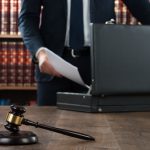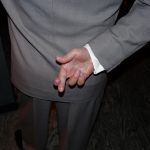The Law on Making a False Declaration

Former One Nation Senator Rod Culleton has been referred to police over allegations he made a false declaration in his candidacy nomination for the upcoming federal election.
The Australian Electoral Commission (AEC) has specifically requested that police investigate whether Mr Culleton falsely declared that he was not an undischarged bankrupt when he completed the relevant forms.
Bankruptcy
In late 2016, the Federal Court found that Mr Culleton was bankrupt due to a $280,000 debt to a Perth businessman. His Senate seat was declared vacant as a result.
The AEC has since found that a search of the National Personal Insolvency Index suggested an undischarged bankrupt at the time of his nomination and failed to disclose this on his candidate nomination form.
The Australian Federal Police has been asked to examine whether a false declaration has been made “relating to his status as an undischarged bankrupt and the prima facie disqualification of such persons to be chosen or to sit as a Senator… under section 44(iii) of the Constitution”.
Legislation
The Oaths Act 1900 (Cth) regulates the administration of oaths and affirmations in Australia.
Section 25 of the Act provides that:
“In all cases where by this Part, or under the authority thereof, or by virtue of any power or authority hereby given, a declaration:
- is substituted in lieu of an oath or affidavit, or
- is directed or authorised to be made and subscribed, although not substituted in lieu of an oath or affidavit,
any person who wilfully and corruptly makes and subscribes any such declaration, knowing the same to be untrue in any material particular, shall be guilty of an indictable offence and liable to imprisonment for 5 years.”
The provision covers a range of documents, including statutory declarations, and it is frequently the case that documents will specify that they are subject to the section by including the following pro forma:
“ I am further aware that a person who knowingly makes a false statement in a statutory declaration is guilty of an offence under sections 25 and 25A of the Oaths Act 1900 (NSW) and Chapter 5 of the Criminal Procedure Act 1986 (NSW); or
I make this solemn declaration conscientiously believing the same to be true, and by virtue of the provisions of the under the Oaths Act 1900 (NSW).”
Case law
It was explained in Einfeld v R [2008] NSWCCA 215 that, “Under s 25 it is a serious indictable offence to wilfully and corruptly make a declaration knowing it to be untrue in any material particularly in any case where a declaration is authorised to be made.”
Former Federal Court judge Marcus Einfeld was sentenced to at least two years in jail for lying to evade a speeding fine.
While Einfeld pleaded guilty to perjury and making a false statement with intent to pervert the course of justice, Judge Einfeld’s barrister Mr Campbell SC acknowledged that had the declarations made been in accordance with Part 4 of the Oaths Act, he might have been liable for prosecution under Section 25.
In Council of the Law Society of New South Wales v Kim [2017] NSWCA 292, the son and father of a solicitor by the name of Ms Jinhi Kim were each issued with a penalty notice for a speeding offence. This was one of many issued to the son while working as a courier.
Ms Kim repeatedly changed the names in the declaration of driver in the penalty notices to those of her former husband and a client.
She stated the names were true and correct, and that she had witnessed the signatures of the declarants, being those of her the ex-husband and client.
The lawyers was subsequently charged with four offences of wilfully and corruptly making and subscribing a false declaration under Section 25(b) Oaths Act.
The NSW Court of Appeal described the conduct as a “serious offence”, and required Ms Kim to formally notify the Law Society of the conduct, pursuant to section 51(1)(a) of the Legal Progression Uniform Law.







